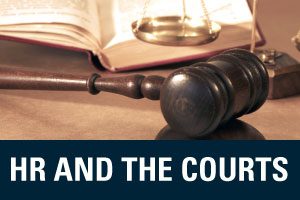HR and the Courts
Each month, CUPA-HR General Counsel Ira Shepard provides an overview of several labor and employment law cases and regulatory actions with implications for the higher ed workplace. Here’s the latest from Ira.
Several States Consider Legislation Aimed at Softening Federal Workplace Vaccine Mandates
The Arkansas legislature recently passed legislation which would soften the federal employer workplace vaccine mandate. The legislation would allow workers in Arkansas to opt out of the mandate if they show a negative COVID-19 test weekly or present a positive antibody test twice a year. The legislation would bar employers from terminating employees who followed the testing protocol. Ohio and Texas are considering similar legislation. Montana enacted a statute that prohibits employer mandates of shots that are under emergency use authorization and have not cleared final approval.
State laws which directly conflict with federal statutes are arguably preempted and unenforceable under the U.S. Constitution’s Supremacy Clause. Depending on how the state statute is worded there are gray areas which will be subject to litigation. For example, a state could argue that an employer may well be able to adhere to the state statute and the final Occupational Safety and Health Administration rule depending on how that final rule is written.
NLRB General Counsel States That Political and Social Justice Advocacy in Black Lives Matter Demonstrations and Demonstrations Opposing Crackdowns on Undocumented Workers are Protected Concerted Activity Under the National Labor Relations Act
National Labor Relations Board (NLRB) general counsel stated in a webinar hosted by Cornell University on Wednesday, October 7, that Black Lives Matter protests and demonstrations against crackdowns on undocumented workers are protected under the National Labor Relations Act (NLRA) as protected concerted activity. The general counsel referred to the case the NLRB brought against Home Depot in Minneapolis because it disciplined workers who refused to cease displaying political messages on their aprons at work, including an employee who was terminated for displaying a “BLM” slogan. The NLRB in that case also accused Home Depot of unlawfully threatening employees with unspecified consequences if they engaged in group activities regarding racial harassment.
Home Depot has denied any violation of the NLRA and in a statement said it does not tolerate workplace harassment, takes these matters seriously, and is committed to diversity and respect. Home Depot takes the position it has every right to refuse to allow its employees to engage in conduct which will spark conflict and possibly confuse customers. It added it has a right to refrain from allowing its employees to engage in speech in this way while serving customers.
NLRB General Counsel Asserts That College Athletes are Employees Under the NLRA and Should be Accorded the Right to Unionize and Collectively Bargain
The top lawyer and general counsel for the National Labor Relations Board (NLRB), Jennifer Abruzzo, asserted in a public memo issued on September 27 that college athletes are employees and should be afforded the right to engage in protected concerted activities, including the right to unionize and collectively bargain. Abruzzo has the authority to bring a test case before the five-member NLRB who have exclusive jurisdiction to decide whether or not college athletes are employees and whether they have a right to unionize and participate in concerted activities protected under the National Labor Relations Act (NLRA). The NLRB does not have jurisdiction of public colleges and universities, only private colleges and universities. However, Abruzzo may attempt to assert jurisdiction over public college athletes under the theory that the National Collegiate Athletic Association (NCAA), which is private, is a joint employer of public college athletes and can negotiate certain minimum guarantees under a collective bargaining agreement. This is an untested legal theory.
The issue has been under increasing debate, most recently as a result of a Supreme Court decision criticizing the stance of the NCAA in limiting student compensation of athletes on antitrust grounds in NCAA v. Alston. The Supreme Court did not address the issue of whether student athletes are employees under the NLRA. Adding to the controversy is that it is not unusual for a college football coach to earn in excess of $1 million per year.
CUPA-HR will continue to monitor developments in this area.
Several Colleges File an Appeal of a Federal Court Decision to Allow Student-Athletes to Proceed to Trial Over Whether They are Employees Under the Fair Labor Standards Act and Therefore are Due Minimum Wage and Overtime Payments
A federal district court trial judge recently ruled that student-athletes are employees under the federal Fair Labor Standards Act and are therefore entitled to minimum wages and overtime payments. The judge used the same multi-factor approach used in cases where unpaid interns have been successfully sued and were entitled to pursue a claim of minimum wages and overtime payments (Johnson v. NCAA (E.D. Pa. No. 19-cv-19350, 9/29/21)).
A group of institutions including Cornell, Fordham, Villanova, Layfette College and Sacred Heart University has asked the eastern district of Pennsylvania judge to allow an immediate appeal to the U.S. court of appeals for the third circuit. They want to ask the third circuit to decide: (1) Are student-athletes ever employees of the schools for which they compete?; and (2) If so, under what circumstances are student-athletes considered employees of their schools?
CUPA-HR will continue to monitor developments in this case.



